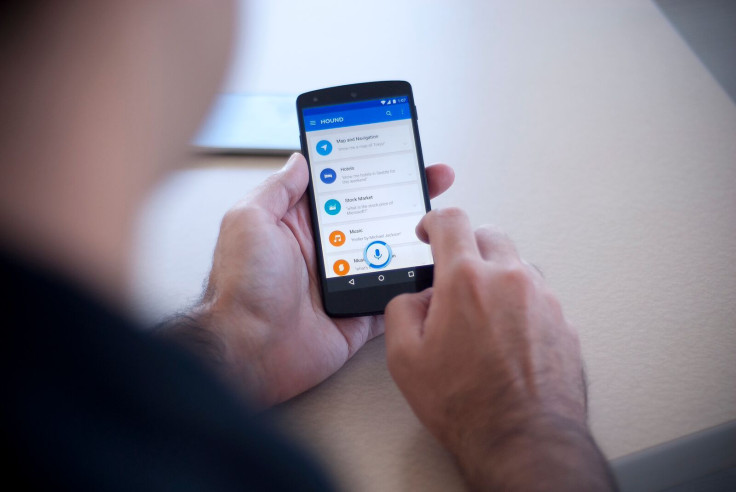Apple's Siri, Google Now And Cortana Have Serious Competition With Hound

Okay, Google, you’ve got competition now. Siri, you too, and Cortana, you’re on notice. Soundhound announced Tuesday the beta launch of Hound, a voice-enabled search assistant that responds to more queries, more quickly, than any of its competitors. The company also announced the private beta launch of Houndify, a developer platform that will give companies the chance to add its services or information to Hound. The announcement included word that Expedia, the travel booking service, has already partnered with Hound to enable users to book flights and hotel rooms using Hound.
“It's the right time," Soundhound founder Keyvan Mohajer told International Business Times. "We want to enable the whole world to use voice."
An Established Technology
Voice recognition has been around for a while, first as a science fiction fantasy and, for the past 20 years, in real-life computer software. In the past half-decade, thanks to services like Apple’s Siri and Google Now, it’s begun to take root in our everyday lives. According to Northstar research commissioned by Google, more than half of U.S. teenagers use voice-enabled functions on their phones every day, and more than 40 percent of adults do, for things like dictating text messages, getting directions and answering basic factual questions.
People are drawn to these kinds of services because, according to Stone Temple Consulting analyst Eric Enge, speaking is more natural than typing, even for digital natives. “Keyboard usage is not how we were born to communicate,” Enge said. “That's something that's been glommed on to help us interact with machines.”
Speaking to a device, on the other hand, feels different: “It makes it feel more like you're interacting with it rather than dealing with it,” he said.
But the contexts in which voice can be used are still limited. You can ask your phone what the capital of Japan is, but good luck using it to order sushi or book a flight to Tokyo. While Siri and Google Now both have artificial intelligence dimensions that are designed to anticipate questions and tailor replies based on individual user information, both are trying to work through privacy concerns and figure out how much intimacy is appropriate.
A Better, Faster Mousetrap
The replies these services send back also still take a while. Compared to what comes back when we type commands, or tap and swipe, voice-enabled apps take a seeming eternity to respond to our requests. For any voice-enabled app to work, two distinct processes need to occur. The app first needs to identify the words a user utters, then it needs to send those words to a separate engine that processes and comprehends them so it can respond in an appropriate way. Hound does both at the same time, drastically reducing the amount of time it takes to reply to users.
“Most people will say that's a bad idea,” Mohajer said. “It's a very good idea. It's just really hard to do.”
Hound’s natural language processing is sophisticated, too. It can talk about a number of different subjects and topics simultaneously, hopping back and forth between them. It can handle typically difficult things like negation, double negatives.
It can also talk about more things. It's active in 50 so-called "domains," or areas of conversation that might occur between a user and a device, compared to 20 for Google. Mohajer says it is on track to top 100 domains by the end of the year. Expanding the list of things people can talk to their devices about should prove useful.
“If it really works, it's going to pull people in,” Dan Olds, principal at Gabriel Consulting Group, said.
A Layer For Everybody
But Hound, at the end of the day, is really just designed to show what the app’s core technology can do for other businesses. “You can't launch a platform without a product,” Mohajer said. “One of the reasons for Hound is to showcase the power and potential of Houndify.”
Houndify, while still in private beta, is designed to be something any developer can put to use. The company put its efforts to the test by giving programmers fresh out of college access to Houndify, just to see if they could find a use for it. Mohajer said that all of them, within days, figured it out. Today’s launch with Expedia is the first of a number of partnerships Hound expects to announce in the coming months.
Early interest, they’re hoping, will beget further interest. “What they're looking for is to speed the acceptance,” Olds said.
Just as it faced an uphill battle against Shazam in the music recognition space, Hound will be in for a fight to build awareness for this new service. Apple, Google and Microsoft have all invested heavily both in developing their voice features, and carving out space for Hound and Houndify will be a challenge. Mohajer thinks the quality of his product will make the difference. “Tesla was not the first electric car,” he said. “The iPod wasn’t the first MP3 player.”
© Copyright IBTimes 2024. All rights reserved.





















